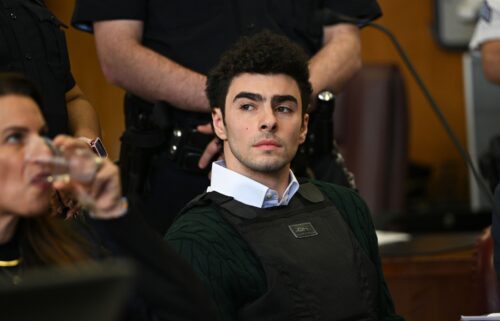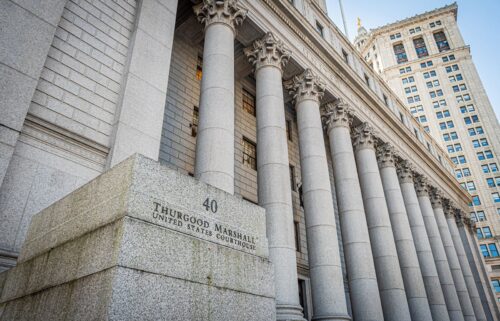Blinken met Netanyahu in Israel as US ramps up push for a ceasefire deal
By Jennifer Hansler, CNN
(CNN) — US Secretary of State Antony Blinken held another round of high-stakes talks in Israel on Wednesday as the US seeks to ratchet up the pressure on Hamas to accept a ceasefire and hostage release deal, while also seeking to forestall an Israeli military offensive in Rafah and further address the humanitarian crisis in Gaza.
The top US diplomat arrived in Tel Aviv on Tuesday after stops in Saudi Arabia and Jordan – capping off his seventh round of shuttle diplomacy in the region since Hamas’ October 7 attack.
Blinken met with Israeli Prime Minister Benjamin Netanyahu for about two and a half hours, first privately and then with the US and Israeli delegations.
In that meeting, Blinken “discussed ongoing efforts to reach an immediate ceasefire in Gaza as part of a hostage deal and emphasized that it is Hamas that is standing in the way of a ceasefire,” according to a readout from the US State Department. The top US diplomat voiced that message publicly in remarks in a meeting earlier on Wednesday with Israeli President Isaac Herzog.
Blinken also reiterated to Netanyahu “the United States’ clear position on Rafah,” the State Department readout said.
In a remarks to the press before departing Israel for Washington, Blinken said that the US position on a large-scale Israeli military offensive in Rafah, where more than a million Palestinians have fled, “won’t change.”
“We cannot, will not support a major military operation in Rafah, absent an effective plan to make sure that civilians are not harmed – and no, we’ve not seen such a plan,” Blinken said, noting that there are ongoing conversations with the Israelis about “better ways” to deal with Hamas.
Despite warnings from Blinken and other top Biden officials, the Israeli prime minister has continually said he would carry out such an operation with or without a ceasefire deal, and with or without US support.
Although US officials said Tuesday they do not view an Israeli military operation into the southern Gaza city as imminent, it has the potential to scuttle the fragile negotiations to secure a ceasefire and the release of the hostages. The pressure around reaching such a deal has only grown as the humanitarian crisis in Gaza deepens and domestic US political pressure continues to mount.
Protests in opposition to Israel’s war in Gaza have broken out at universities across the US, some of which have been forcibly dispersed by massive police deployments.
In Israel, too, there have been protests calling for the government to make a deal to bring home the hostages held by Hamas. Blinken greeted some of these protesters who had gathered outside his meeting with Herzog in Tel Aviv, telling them that the US will “not rest until everyone” is back home.
Following his meetings in Tel Aviv, Blinken traveled to Kibbutz Nir Or, which was immensely impacted by the October 7 Hamas attack. During this visit, Blinken stopped at the home of the Kedem Siman Tov family, where all five members of the family were killed – Tamar Kedem Siman Tov, 35; Yonatan “Johnny” Siman Tov, 36; 5-year-old twin daughters, Shahar and Arbel; and son Omer, 2. Johnny, Shahar, Arbel and Omer were American citizens, according to the State Department.
He also visited Kerem Shalom, a key border crossing that has been central to getting aid into Gaza. Blinken pushed Israeli officials to do more not only to get the critically needed aid into the enclave, but also to make sure it is accessible to those in need. At Kerem Shalom, Blinken received a closed briefing on humanitarian aid and deconfliction, according to the traveling press, and then was given a tour of the crossing, accompanied by Israeli Minister of Defense Yoav Gallant and UN Senior Humanitarian and Reconstruction Coordinator for Gaza Sigrid Kaag
US officials have painted a ceasefire agreement as a linchpin to vastly improve the humanitarian crisis. They have signaled some optimism about the potential of reaching such an agreement, which would also include the release of the hostages held by Hamas, after Israel put forward what Blinken described Monday as an “extraordinarily generous” proposal.
On Wednesday, Blinken again called on Hamas to accept the proposal on the table, suggesting that it was as good a deal as the group was going to get.
“There is no time for delay. There is no time for further haggling. The deal is there. They should take it,” he told the press in Israel.
“Israel has made very important compromises in the proposal that is on the table, demonstrating its desire and willingness to get this agreement and get it done,” Blinken said.
Negotiators from Egypt, Qatar, the US, and Hamas gathered in Cairo as the latter considered a new framework proposed by Egypt that calls for the group to release as many as 33 hostages kidnapped from Israel in exchange for a pause in hostilities in Gaza, an Israeli source familiar with the negotiations and a foreign diplomatic source told CNN earlier this week.
Israel helped craft that proposal but has not fully agreed to it, sources said. An Israeli delegation also participated in the meeting in Cairo, an Israeli official told CNN Wednesday.
Hamas on Wednesday warned that Israel won’t achieve through negotiations and “pressure” what it has been unable to achieve through nearly seven months of war.
“Netanyahu and all his supporters are disgracefully imagining that they would achieve through pressure and political machinations what they could not achieve with war fire,” Izzat Al-Rishq, a member of Hamas’ political bureau, wrote on Telegram.
Al-Rishq did not reject the proposal but implied Hamas was not yet ready to agree to it. He said Israel has “poured tons of lava and explosives on Gaza and did not break the resistance. God forbid they could extract through negotiations what they were unable to achieve through war.”
Even as the US seeks to secure a deal that it says will improve the long-term situation in Gaza, Blinken pushed Israeli officials to do more in the immediate term to address the humanitarian catastrophe in the coastal enclave.
Humanitarian crisis
Blinken’s visit is his latest since the deadly Israeli strike on a World Central Kitchen aid convoy in Gaza in early April. That strike, which the Israel Defense Forces claimed responsibility for, sparked immense furor and the most pointed calls yet from the Biden administration for Israel to protect civilians and take more action to address the humanitarian situation in the war-torn strip.
“If we don’t see the changes that we need to see, there’ll be changes in our own policy,” Blinken warned at a news conference last month.
In his meeting with Netanyahu Wednesday, Blinken “discussed the improvement in the delivery of humanitarian aid to Gaza since the call between President Biden and Prime Minister Netanyahu on April 4 and reiterated the importance of accelerating and sustaining that improvement,” the readout from the State Department said.
Although Israel had committed to changes – opening new crossings, allowing more trucks into Gaza, creating a deconfliction mechanism – it has been slow to institute them. The Biden administration has also faced criticism from aid officials who say they are preoccupied with counting trucks, rather than addressing the whole crisis.
On Wednesday, Blinken said there has been “real, meaningful progress” on humanitarian aid “that is starting to make a difference for people in Gaza,” but the progress must be “accelerated” and “sustained.”
He said aid trucks were able to access north Gaza via the Erez crossing for the first time on Wednesday, and also pointed to the soon-to-be operational US maritime channel.
Still, “as we focus on all of the necessary inputs, the number of trucks that are moving, what matters the most is the impact. And we’re focused on measuring that, making sure that people are actually getting what they need, that it’s being delivered to them,” he said.
The top US diplomat also said Tuesday it is “critically important that there be a clear, affirmative list of items of products that are required for the well-being of people in Gaza … and that we don’t have arbitrary denials of products that need to get into Gaza.”
This story has been updated with additional developments.
CNN’s Ibrahim Dahman contributed to this report.
Correction: An earlier version of this story misidentified Israeli Ambassador Michael Herzog in a photo caption provided by the pool.
The-CNN-Wire
™ & © 2024 Cable News Network, Inc., a Warner Bros. Discovery Company. All rights reserved.


